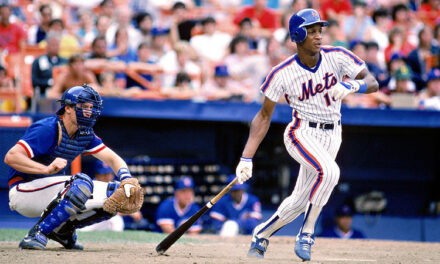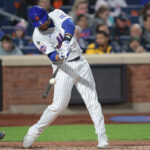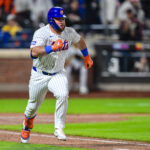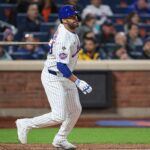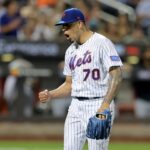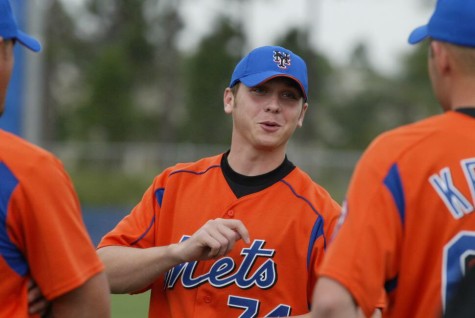
More than two and a half years have passed since Scott Kazmir last appeared in a major league game.
The date was September 23, 2016, when the former top pitching prospect toed the rubber for the Los Angeles Dodgers in his 12th big league season. It would be Kazmir’s first start back in over a month for L.A. after he landed on the disabled list with neck inflammation and later thoracic spine inflammation.
Kazmir threw 19 pitches in a scoreless first inning against the Colorado Rockies at home, however, he was replaced by rookie pitcher Ross Stripling before tossing a pitch in the second. The southpaw was pulled after experiencing right intercostal spasms, a similar issue Kazmir faced in a minor league rehab start just a few weeks prior.
His season was over.
He returned for spring training in 2017, in the second year of his three-year contract had signed with L.A. in December 2015. A major decrease in velocity in which Kazmir was sitting in the low-to-mid 80s after averaging a low-90s fastball in ’16 – coupled with hip tightness which messed with his flexibility and mechanics – sidelined the lefty for the entire ’17 season, aside from four minor-league rehab appearances totaling 12.0 innings.
A financially-motivated blockbuster trade in the 2017-18 offseason saw the Dodgers trade Adrian Gonzalez, Brandon McCarthy, Charlie Culberson, Kazmir and cash considerations to the Atlanta Braves for outfielder Matt Kemp.
Kazmir appeared in five spring games for the Braves, posting a 4.22 ERA with a 1.69 WHIP in 10.2 innings pitched. The Braves released the veteran starter near the end of spring training, with Kazmir sitting out the entire year in part due to personal family matters.
The mental and physical obstacles Kazmir underwent while trying to work his way back to a major league mound were strenuous, while the prospects of making a comeback were slowly fading.
Baseball is a fickle game, one in which age and injuries deplete the skills of every player at some point. Some experience prolonged success and go out on their own terms, while others watch their once high skill set diminish quicker than others.
Kazmir fits the latter.
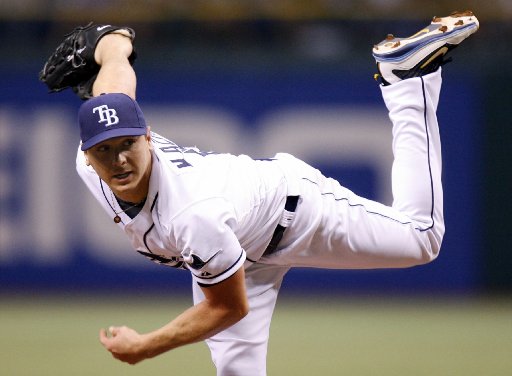
The former 15th overall pick by the New York Mets in the 2002 First-Year Player Draft out of Cypress Falls High School in Houston, Texas, was considered one of the best arms in the draft. Armed with an explosive fastball that sat in the low-to-mid 90s with movement, along with an overpowering slider, Kazmir was one of the most intriguing and well-regarded prospects in the game.
From 2003-05, Kazmir was rated no lower than 12th on Baseball America’s Top-100 Prospects lists, and was dominating older competition while working his way up through the Mets’ minor league affiliates.
Fans’ excitement grew over the eventual arrival of Kazmir in Queens, where the hard-throwing left-hander would one day don the orange and blue with the potential of being a top of the rotation starter in an aging rotation.
Those plans were upended on July 30, 2004.
On the morning of, the Mets were sitting in fourth place in the N.L. East, six games out of first and nine games out of the Wild Card race. In a clear short-term move, then Mets GM Jim Duquette made two separate trades a day before the non-waiver trade deadline:
- Dealing Matt Peterson, Jose Bautista and Ty Wigginton to the Pittsburgh Pirates for Jeff Keppinger and Kris Benson.
- Dealing Jose Diaz and Scott Kazmir to the Tampa Bay Devil Rays for Bartolome Fortunato and Victor Zambrano.
The ensuing results were not kind for the Mets, as Zambrano was already dealing with a balky right elbow and made just three starts for the Mets in the rest of the ’04 season.
Meanwhile, the then 20-year-old Kazmir was set to make his major league debut with Tampa Bay less than a month later, firing five shutout innings against the Seattle Mariners on the road.
From regrettable quotes like then pitching coach Rick Peterson suggesting to Mets personnel that he could fix Zambrano in “10 minutes,” to Duquette explaining that there were too many “cooks in the kitchen” in regards to the decision-making process, the Kazmir trade left not only the fans disappointed, but the young Texan as well. He grew to love the organization and yearned to prove that the club made the right decision in selecting him in the first round just two years prior.
Instead, Kazmir took that initial motivation along with his intriguing arsenal to Tampa Bay.
From 2005-08, Kazmir was one of the best American League starting pitchers. Among qualified A.L. pitchers, Kazmir was tied for fourth in ERA (3.51), second in strikeout percentage (25.1) and tied for sixth in fWAR (14.4). He made two All-Star appearances with Tampa Bay (’06, ’08) and one in his lone season with the Oakland Athletics in 2014.
In total, Kazmir appeared in 298 major league games (297 starts), with a lifetime record of 108-96 and a 4.01 ERA. Among all-time Tampa Bay pitchers, Kazmir is third in wins (55), fourth in innings pitched (834.0), fourth in strikeouts (874) and third in bWAR for pitchers (16.5).
At 35, Kazmir is still holding out hope that he could make a return to the majors. After attempting a throwing program this past offseason, Kazmir had to shut it down as he wasn’t where he needed to be psychically.
While remaining hopeful and realistic about his future in the game, Kazmir looks back on his time in the majors with great pride. From the success he had with Tampa Bay, including a trip to the World Series in ’08, to making a comeback with the Cleveland Indians in 2013 after being out of baseball for nearly two seasons – which included a stint with the Sugar Land Skeeters of the independent Atlantic League – Kazmir reflects fondly on his tenure in the game.
I had the privilege of speaking with Kazmir in mid-April, where we discussed being drafted by the Mets, the infamous trade, and his success with Tampa Bay.
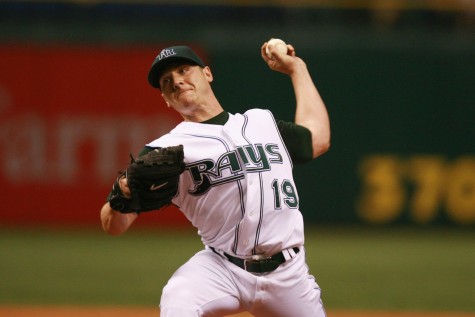
MMO: Who were some of your favorite players growing up?
Kazmir: I was always an Astros fan. I’m from Houston and I was always a fan of the Killer B’s. To be honest, most of the games were blacked out when I was a kid, so I was watching a lot of the Braves’ games and everything that was on WGN like the Cubs and White Sox. I was always a big David Justice and Andruw Jones fan.
MMO: At what age did you start primarily focusing on pitching?
Kazmir: I’d probably say I was eleven or twelve when I started taking it seriously and pretty much playing year-round in Houston and throughout the country.
MMO: What are your memories from the 2002 Draft? It seemed as though the Cincinnati Reds were set to take you with the third overall pick and got scared off by potential contract demands. Were you aware of the Mets’ interest?
Kazmir: At the time, no. The days leading up to the Draft I thought it was pretty set on the Reds. It was literally the morning of that I got a call that said it was not going to happen.
Throughout the entire Draft, it was kind of just hanging on wondering where I’d go. Once I got selected by the Mets, I was very excited knowing that I’d be with an organization that is very popular and just has a lot of history.
MMO: You excelled and built up quite the billing while pitching with several of the Mets’ minor league affiliates. Being the club’s top pitching prospect, along with the lofty expectations that come with it, did that put any additional pressure on you? Or, did you embrace it?
Kazmir: I think I embraced it. Everyone throughout the organization that was there at the time was awesome and made me feel very comfortable throughout every single level that I went to.
As soon as I got to pro ball, I had the privilege of having HoJo as my manager and [Bobby] Ojeda as my pitching coach. It was pretty fun to break into pro ball that way and really be able to talk with those guys and just get used to living the pro ball lifestyle.
MMO: A day Met fans won’t forget and are still upset over is July 30, 2004: when you were dealt along with Jose Diaz to Tampa Bay for Bartolome Fortunato and Victor Zambrano. What were your first reactions when you heard the news that you were being traded?
Kazmir: I was in Binghamton [Double-A] at the time and I honestly thought that the guys were not telling the truth. They brought me into the office and I thought they were just joking with me because we joked around throughout the entire year because we were very comfortable.
They were like, “This is not a joke. You’ve got to take this call pretty soon and head to an affiliate with the Rays.”
It was devastating for me, to be honest with you. It was a team I grew to love and I really wanted to show the organization and fans that they made the right decision in drafting me and I wasn’t able to do that.
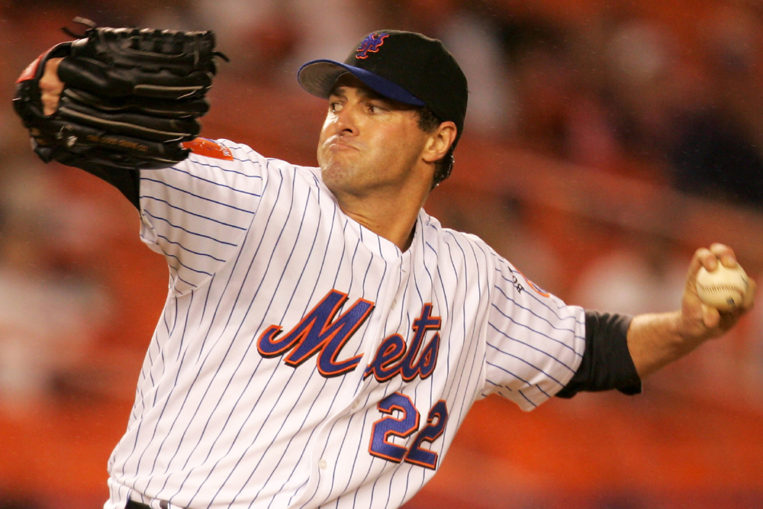
MMO: There was a report that perhaps some of the veterans on the Mets were unhappy with some of your antics, which included changing the music in the clubhouse during spring training. Do you think there was any validity to rumors that some of the veterans might have spoken to the front office about you, or do you think it’s much ado about nothing?
Kazmir: I think that whole thing was blown way out of proportion. I don’t think it was even an issue to begin with but somehow it got out [about the changing of the music], and it was unfortunate how everything went down but there are no regrets with anything that happened.
I felt I learned so much throughout that the one spring training where I had all of those veterans like John Franco, Al Leiter and all of those guys. They were great to me for the month and a half that I was there in spring training and I learned so much.
MMO: Less than a month after the trade to Tampa Bay, you were called up and made your major league debut in Seattle against the Mariners. You went five scoreless innings while scattering four hits for the win. What memories do you have from that day and game?
Kazmir: It kind of felt like a blur to be honest with you. It seemed like I blinked and I was in the fifth inning because I was so amped up.
From what I remember when I was warming up, it only took me twelve or thirteen pitches. I told the pitching coach, ‘I was ready to go,’ and he was in shock. But judging by how the bullpen went he said, “All right, let’s do it!”
I knew the batters I was going to face coming up: Ichiro, Randy Winn and Edgar Martinez. It was guys that I knew I had to be amped up right out of the gate for. It was awesome.
I remember Jose Cruz Jr. hit a home run in the sixth inning to give us a big lead. It was a memorable day.
MMO: From 2005-08, you were one of the best pitchers in the American League. Among qualified A.L. starters, you tied for the fourth-best ERA (3.51), second-highest K% (25.1) and tied for the sixth-best fWAR (14.4). What do you attribute your early success to with Tampa Bay?
Kazmir: I think a lot of that has to do with the staff that I had when I came to the Rays. I had a great training staff that really embraced everything about pitching preparation. I was really able to stick to a good program and had hands-on treatment that I started progressing with. Everything was feeling more and more comfortable. I was getting more consistent with my delivery and I credit the entire training staff that we had.
MMO: Your 2008 club, which won the A.L. East with 97 wins and ended up facing the Philadelphia Phillies in the World Series, was a fun and young team. To you, what made that club so special?
Kazmir: I think we knew we had something at the end of the 2007 year. We were very confident heading into the offseason. We knew we had some guys that were coming up like [Evan] Longoria and David Price. We knew we were going to get full seasons out of them and that they were special.
We just had fun with it. Knowing we’d go to Boston and New York and we’d be these young guys facing these established veterans, we knew we were capable of beating those teams. We just had that swagger about ourselves the whole year.
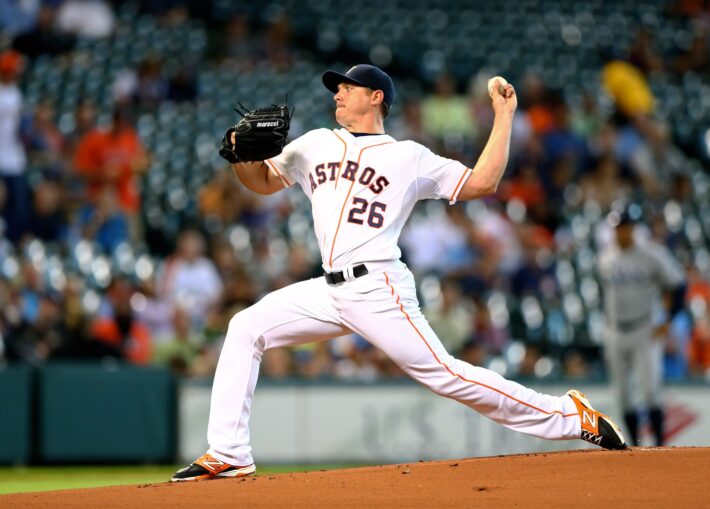
MMO: You battled a series of injuries following that ’08 season, and eventually were released by the Los Angeles Angels in 2011. You signed with the Sugar Land Skeeters, an independent league team, in 2012 before signing a minor league deal with the Cleveland Indians prior to the ’13 season.
Can you talk a bit about some of the things you went through in re-establishing yourself in terms of fundamentals, mechanics and velocity?
Kazmir: Those were tough times. Not being able to do what I loved my entire life in playing baseball, it was tough. I ended up playing in a couple of winter leagues in the Dominican, Puerto Rico and then independent ball to get my innings and just try to reestablish myself. It made me a stronger person, a better player and it’s something I’ll never regret.
I’ll never think of a different path that I should’ve taken because I feel like that was the path that was for me. It really helped me grow up as a person and a player.
MMO: What was the main issue you were facing in your comeback?
Kazmir: It was more physical stuff than mechanics. It was just little things with flexibility and it was tough to be able to bounce back every five days. It was new environments where it was new stuff going on where it was really tough to be consistent to be honest with you. I just had to go back to square one; learn the fundamentals again, get that flexibility back and just get my innings up.
MMO: I read an ESPN article that detailed some of the work you did with Ron Wolforth – a renowned pitching guru – in your attempts to get back to the majors. How important was he in resurrecting your career?
Kazmir: He was great in the fact that he had some great fundamental stuff just to get you back to good fundamentals as far as your delivery. I think that after I kind of started feeling comfortable with that I took that to my old [routine]; when I was in high school just doing long tosses as long as I can, and stuff like that.
I think long toss, after the fact of getting my fundamentals and mechanics right, that really contributed to getting my arm strength back and getting back into the big leagues.
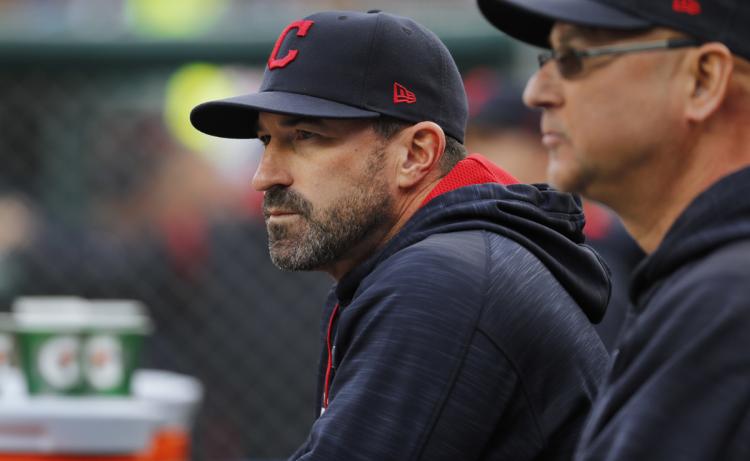
MMO: In your lone season with the Cleveland Indians, you got to work with then pitching coach Mickey Callaway. What were your impressions of him?
Kazmir: He was awesome to work with! One of the best pitching coaches I’ve ever been around. Just the guy, being able to talk with him, he’s very easygoing. You can talk to him about anything!
He really made you feel comfortable out there and he made you feel like he was rooting for you. And that’s huge, especially with the environment that you’re in playing in the major leagues. You want someone in your corner. His personality was infectious. Everyone loved being around him and it was a great combo of him and Tito [Francona] in the dugout. It was awesome.
MMO: What does the future hold for Scott Kazmir? Would you like to get back on the mound? Would you look to stay in the game as a scout, coach or broadcaster?
Kazmir: I’m not sure right now. I really want to be back in the game, I want to play some more. This past November, I started to throw again and started my throwing program in December, it just didn’t turn out too well physically. I was a little bit behind in flexibility and everything, so we kind of shut it down.
I’ve got a lot of stuff going on in my personal life; I’ve got a kid who’s one and a half years old now and another one on the way. I have some family stuff health-wise that my mom’s going through, and I’d like to be close to her these next couple of years. So we’ll see what happens.
I really miss the game. I love watching these games and it’s bittersweet because I want to be out there. But I’m loving spending time with my family, that’s for sure.
MMO: Do you still hear from Mets fans who are bitter about the trade all these years later?
Kazmir: [Laughs.] I actually do. Out of any fan base, Mets fans are passionate about the trade. I’ll never hear the end of it.
MMO: When you look back on your career, what are you most proud of?
Kazmir: There are a lot of things to be proud of. I loved working with the young guys, especially when I was a veteran. It was very fun for me to be able to almost coach them throughout the years and everything like that.
If I said anything I’d be proud of, it would be playing the game the right way, playing it cleanly. I think that was the biggest part for me. I think that would probably be the biggest thing for me.
MMO: Thanks for some time today, Scott. It was great to speak with you about your career.
Kazmir: My pleasure. Thanks.
Follow Scott Kazmir on Twitter, @scottkazmir19





